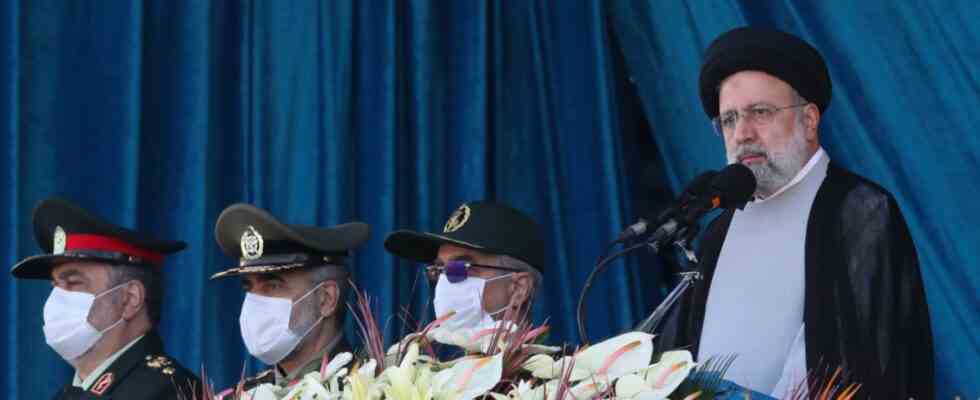A price increase of 300 percent has driven numerous Iranians to the streets across the country in the past few days. Within a few hours, the price of cooking oil quadrupled. The protesters shouted “death to the dictatorship”security forces responded with tear gas and batons, a demonstrator is said to have been shot. As a result of the protests, the internet has been shut down over the past few days. Earlier, President Ebrahim Raisi had also announced the lifting of government subsidies for wheat and a price increase for staple foods.
The latest unrest comes at a time when international negotiations on the nuclear deal with Tehran are stalling. As a result, an end to western sanctions – and a sigh of relief for the Iranian population suffering from the severe economic crisis – is a long way off. While there is some hope after a visit by EU negotiator Enrique Mora, everything now hinges on whether the US and Iran can agree on the Iranian Revolutionary Guards Guards (IRGC) assessment.
Biden’s predecessor, Donald Trump, put the elite unit of the Islamic Republic’s armed forces on the sanctions list in 2019 as part of his “maximum pressure” policy. Tehran is demanding the deletion, for Washington the issue is politically sensitive, also with a view to the midterm elections in November. Because the Revolutionary Guards provide significant support to militias such as the Shiite Hezbollah in Lebanon, the Yemeni Houthi rebels or some Iraqi militias that are hostile to the United States. After the US attack on Iranian General Qassem Soleimani in early 2020 and the killing of two IRGC leaders in Syria in spring 2022, the Revolutionary Guards also announced retaliatory attacks.
Iran has the second largest gas reserve in the world
Behind Tehran’s insistence on removing the Revolutionary Guards from the US sanctions list is a domestic power struggle between conservative and moderate forces. “This waste of time is not in the interests of Iran’s economy,” says Umud Shokri, a Washington-based foreign and energy geopolitics adviser. Iran has the world’s second largest gas reserve and is still struggling with a severe economic crisis, inflation, unemployment and massive environmental problems. According to Shokri, investments of at least US$160 billion would be needed to further develop Iran’s oil and gas industry in order to achieve gas production goals in the coming years.
Because of the war in Ukraine, European countries are now urgently dependent on new oil and gas suppliers. And Iran could deliver a million barrels of crude a day in the short term. But the Iranian infrastructure has been severely affected by the sanctions of recent years and the lack of investment. Even if an agreement is reached in the near future, Iran cannot replace Russia on the European energy market, says Shokri.
In addition, the war in Ukraine has eliminated an important mediator between Iran and the West: Russia. Iran’s return to the world market is currently not in Moscow’s interests. Because that would lower energy prices and Russia would have another competitor on the European market. So it would be better for Moscow if tensions between Iran and the West continued.
“The question now is whether the national interests of Iran and Russia are in conflict in the nuclear talks,” says Shokri. In any case, in the war against Ukraine, Tehran is seeking an ideological alliance with Moscow and is railing against the West and NATO. In recent years, Iran’s foreign policy has turned its gaze east, particularly to Russia and China, in order to establish a fundamental power base vis-à-vis the United States.
“Tehran now believes it can use the Ukraine war to intensify relations with Russia and China and to show that if an agreement is not reached, it can strengthen its position in the new global balance of power,” says Shokri. On the other hand, Tehran is also speculating that, in the face of the energy crisis, Western states are ready to make concessions that they may not have been willing to make before.
The Iranians could also miscalculate with this. “During the cold season, the country has problems supplying its own population. Even natural gas exports to Iraq and Turkey are repeatedly suspended.” It would therefore be in Iran’s interest to back down from the demand and pursue its national interest in the talks, Shokri said. “The nuclear deal is dead if Tehran isn’t convinced by the recent efforts by Qatar or Europe,” Shokri believes.
Success for lobbyists from the Gulf States
The Gulf States would be particularly pleased about this. You were critical of the nuclear deal from the start. According to the latest research by the US investigative portal The Intercept lobbyists from the United Arab Emirates, Saudi Arabia and Bahrain have been “highly active” in the US for the past five years, to provide “messages to congressional staffers, think tanks and the State Department that emphasize the dangers posed by the IRGC”.
Whether tweets, press conferences, panels or reports: for years, communications consultants and law firms financed by the Gulf States have been directing a constant flow of information against the Revolutionary Guards. The issue is now seen as a “poison pill,” a means of blocking further diplomacy with Iran. The nuclear agreement now depends on who swallows it – or whether anyone swallows it at all.

